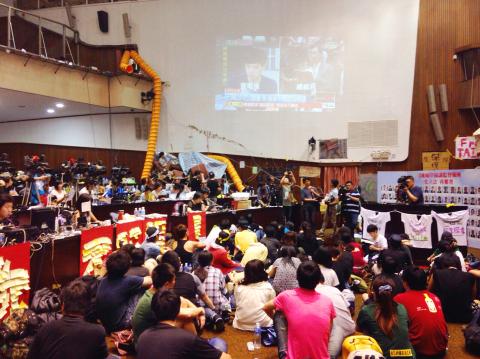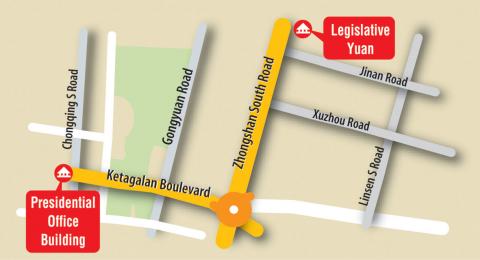Student protesters occupying the legislative chamber in protest against the government’s handling of the cross-strait service trade pact last night denounced a press conference President Ma Ying-jeou (馬英九) held earlier in the day in response to their demands. The students said Ma’s comments lacked both substance and sincerity.
Student protest leader Lin Fei-fan (林飛帆) said that Ma “has apparently refused our main request, which is to institutionalize a special law for the oversight of cross-strait agreements before reviewing the cross-strait service trade pact.”
“By snubbing this demand, the Ma administration has refused the public’s right to amend or veto the agreement. Without the institutionalization of a monitoring mechanism, no one knows by what process the pact would be reviewed,” Lin said.

Photo: CNA
Ma’s response to the request for a citizens’ constitutional conference was incomplete, he said.
Lin said the conference was proposed because the country is facing a constitutional crisis brought about by “an unchecked executive power and a legislative power kidnapped by [Chinese Nationalist Party (KMT)] discipline and [our] electoral system, which is unresponsive to public opinion.”
The students also criticized Ma for backing statements by Premier Jiang Yi-huah (江宜樺) and National Police Agency Director-General Wang Cho-chiun’s (王卓鈞) that forcefully evicting students from the Executive Yuan early on Monday morning — an action in which scores of students and police officers were injured — had been “completely legal.”

“With none of our four requests receiving substantial and concrete promises, we will, as planned, stage a peaceful, adamant demonstration tomorrow [today], and cannot but continue our movement,” Lin said.
Chen Wei-ting (陳為廷), another student leader, said that Ma was “repeating himself.”
“What the president proposed was only allowing us to take a look at the pact, but not to review it in substantial terms [with the possibility of changing clauses],” he said. “What we are asking is to legislate first [for a cross-strait agreement oversight act] before reviewing the pact, but President Ma said the two can take place simultaneously. This will only repeat the history of KMT Legislator Chang Ching-chung’s (張慶忠) 30-second ramming-through [of the service-trade pact].”
“What we mean by ‘the retraction of the cross-strait service trade agreement’ is to have the pact sent back to the Executive Yuan and to also make room for a citizens’ constitutional conference to participate in the review process,” Chen said.
Earlier in the day, the protest leaders said that all members of the public nationwide have to stand up today for their democratic rights and the survival of their hard-won democracy.
Joined by scores of representatives of non-governmental organizations, the protesters told a morning press conference that the rally today in Taipei would be a non-violent one and they cautioned the police against going overboard to enforce the law.
As the students’ occupation of the Legislative Yuan continued into the 12th day, “the government is still ignoring our demand for the institutionalization of a cross-strait agreement oversight mechanism and responding by besmirching our cause and talking nonsense,” the students and civil groups said.
“We will show through the 3/30 Ketagalan Boulevard demonstration that we are not a minority and not a violent mob, but a group of citizens who are deeply worried about our country’s crisis of constitutionalism,” the protesters said in a statement.
The anti-“black-box” service trade pact movement has been followed and echoed by overseas Taiwanese too, they said.
The students also announced that they have established an internal deliberative mechanism to counteract and respond to the government’s future calls for communication, be they private or public.
The announcement was made in response to a hullabaloo caused by a supposedly personal meeting between one of the movement’s leaders, Huang Kuo-chang (黃國昌), an assistant research fellow at Academia Sinica, and Presidential Office Deputy Secretary-General Hsiao Hsu-tsen (蕭旭岑) on Friday.
The meeting, after it was exposed, raised doubts about the secrecy of the unauthorized talk, which other student leaders did not know about.
Calling for an end to the authorities’ “private calls and unofficial release of information, and probing and dividing tactics,” civil groups and student representatives have achieved a consensus over the building up of an internal democratic decision-making mechanism to counteract the Presidential Office’s “off-the-record actions,” one of the student group’s representatives said.
The student leaders also responded to questions from the media about a possible communication between the students and President Ma Ying-jeou.
Student leader Chen said that during the previous discussion about the possible meeting, “we had lost our trust in the Ma administration.”
“We are asking Ma not to use party discipline to restrain his party’s (Chinese Nationalist Party – KMT) legislators’ reaction to the proposal of the institutionalization of a mechanism for overseeing cross-strait agreements,” Chen said. “If he cannot promise this, where is the room for discussion?”

CHAOS: Iranians took to the streets playing celebratory music after reports of Khamenei’s death on Saturday, while mourners also gathered in Tehran yesterday Iranian Supreme Leader Ayatollah Ali Khamenei was killed in a major attack on Iran launched by Israel and the US, throwing the future of the Islamic republic into doubt and raising the risk of regional instability. Iranian state television and the state-run IRNA news agency announced the 86-year-old’s death early yesterday. US President Donald Trump said it gave Iranians their “greatest chance” to “take back” their country. The announcements came after a joint US and Israeli aerial bombardment that targeted Iranian military and governmental sites. Trump said the “heavy and pinpoint bombing” would continue through the week or as long

TRUST: The KMT said it respected the US’ timing and considerations, and hoped it would continue to honor its commitments to helping Taiwan bolster its defenses and deterrence US President Donald Trump is delaying a multibillion-dollar arms sale to Taiwan to ensure his visit to Beijing is successful, a New York Times report said. The weapons sales package has stalled in the US Department of State, the report said, citing US officials it did not identify. The White House has told agencies not to push forward ahead of Trump’s meeting with Chinese President Xi Jinping (習近平), it said. The two last month held a phone call to discuss trade and geopolitical flashpoints ahead of the summit. Xi raised the Taiwan issue and urged the US to handle arms sales to

State-run CPC Corp, Taiwan (CPC, 台灣中油) yesterday said that it had confirmed on Saturday night with its liquefied natural gas (LNG) and crude oil suppliers that shipments are proceeding as scheduled and that domestic supplies remain unaffected. The CPC yesterday announced the gasoline and diesel prices will rise by NT$0.2 and NT$0.4 per liter, respectively, starting Monday, citing Middle East tensions and blizzards in the eastern United States. CPC also iterated it has been reducing the proportion of crude oil imports from the Middle East and diversifying its supply sources in the past few years in response to geopolitical risks, expanding

An Emirates flight from Dubai arrived at Taiwan Taoyuan International Airport yesterday afternoon, the first service of the airline since the US and Israel launched strikes against Iran on Saturday. Flight EK366 took off from the United Arab Emirates (UAE) at 3:51am yesterday and landed at 4:02pm before taxiing to the airport’s D6 gate at Terminal 2 at 4:08pm, data from the airport and FlightAware, a global flight tracking site, showed. Of the 501 passengers on the flight, 275 were Taiwanese, including 96 group tour travelers, the data showed. Tourism Administration Deputy Director-General Huang He-ting (黃荷婷) greeted Taiwanese passengers at the airport and